- Uncommon compassion
- Unwavering dedication
- Unbreakable resolve
Center News & Funding, Community Engagement & Health Equity, Research, Massey 50
Apr 16, 2024
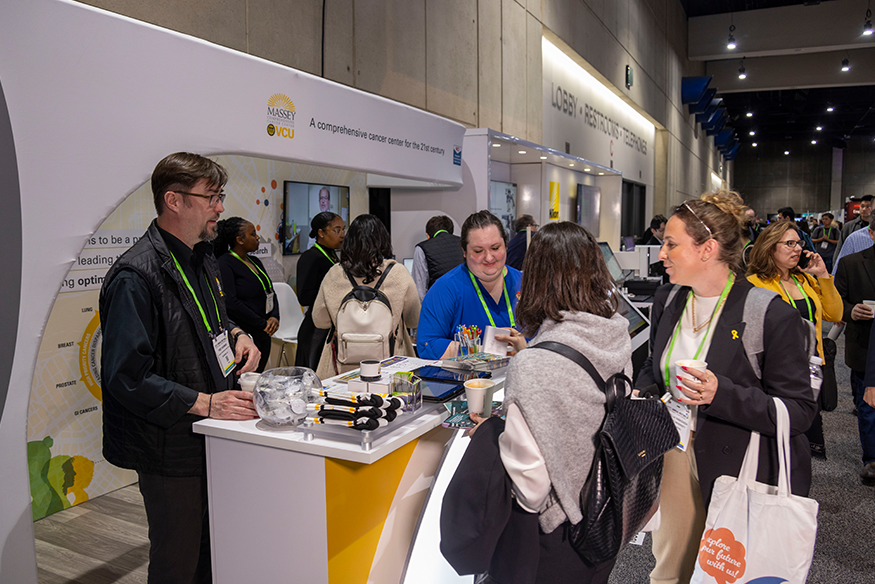
VCU Massey Comprehensive Cancer Center again made a splash as a worldwide leader in cancer care, research and education during the American Association for Cancer Research (AACR) Annual Meeting 2024 in San Diego on April 5-10.
The international conference recorded a record number of registrants this year of more than 23,000, and is billed by the AACR as “the focal point of the cancer research community, where scientists, clinicians, other health care professionals, survivors, patients and advocates gather to share the latest advances in cancer science and medicine.”
Nearly 50 representatives affiliated with Massey and VCU put their expertise and scientific discoveries on display over the course of the conference through panel sessions, informative presentations, Q&A seminars, poster abstracts and more. Additionally, for the first time in Massey’s 50-year history, the cancer center hosted a booth in the exhibit hall of the AACR 2024 Annual Meeting.
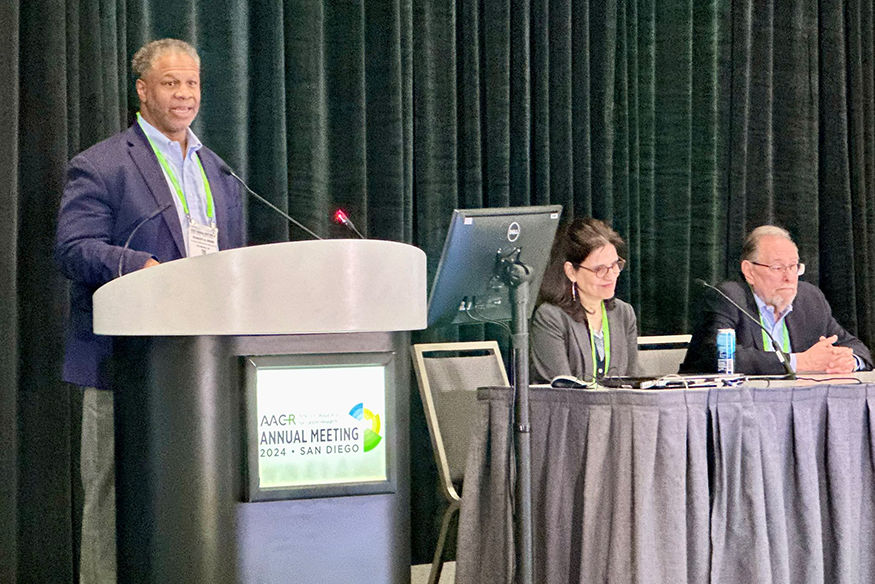

During a grant writing workshop designed to provide new investigators with practical tools to write competitive grants, Massey director Robert A. Winn, M.D., led a presentation titled "Why Write a Grant and How to Keep Going When You Feel Like You Can't."
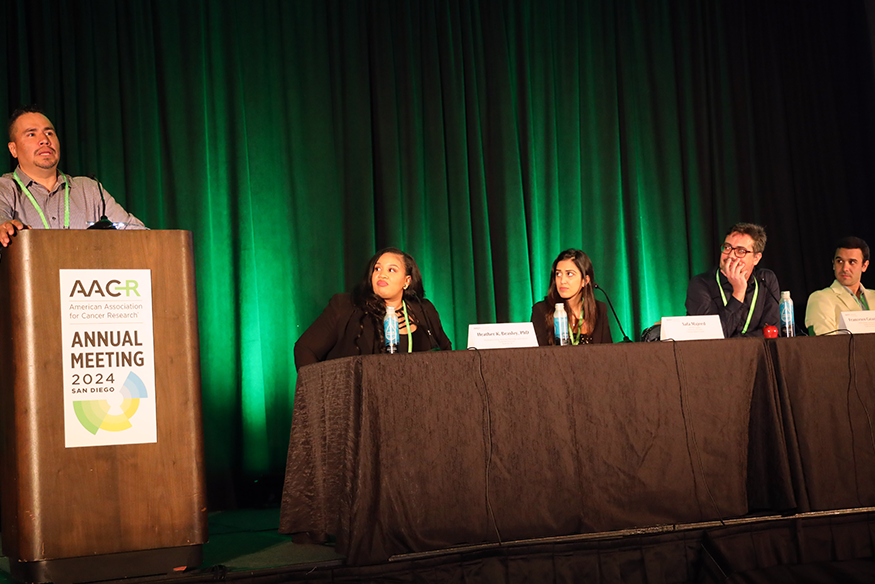




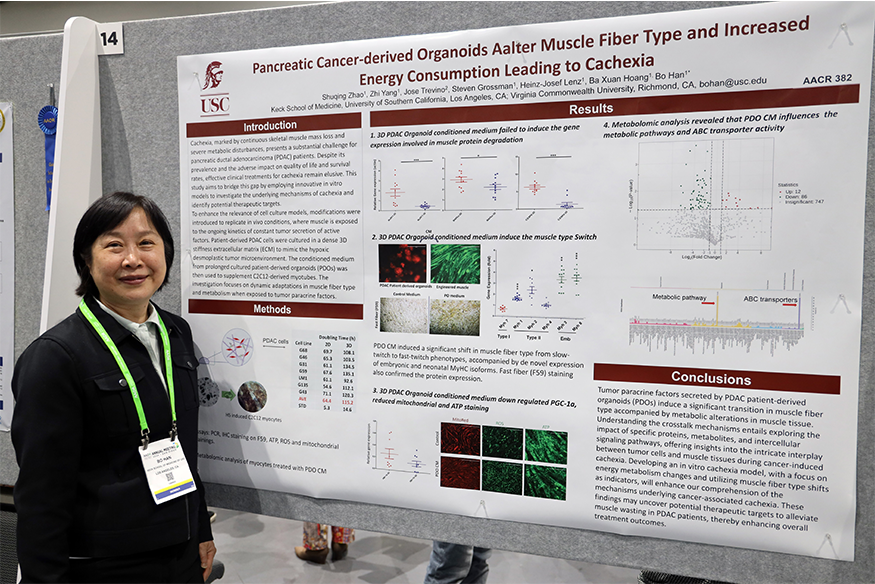
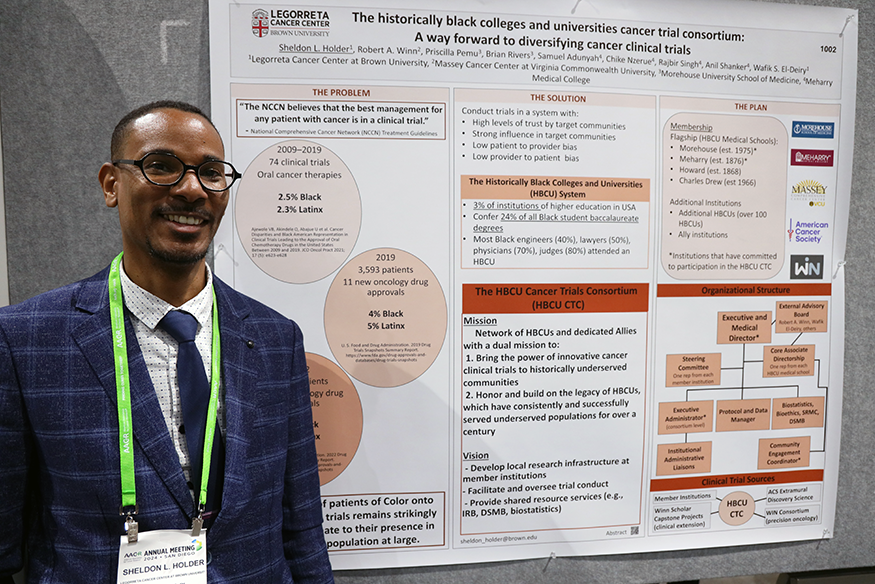

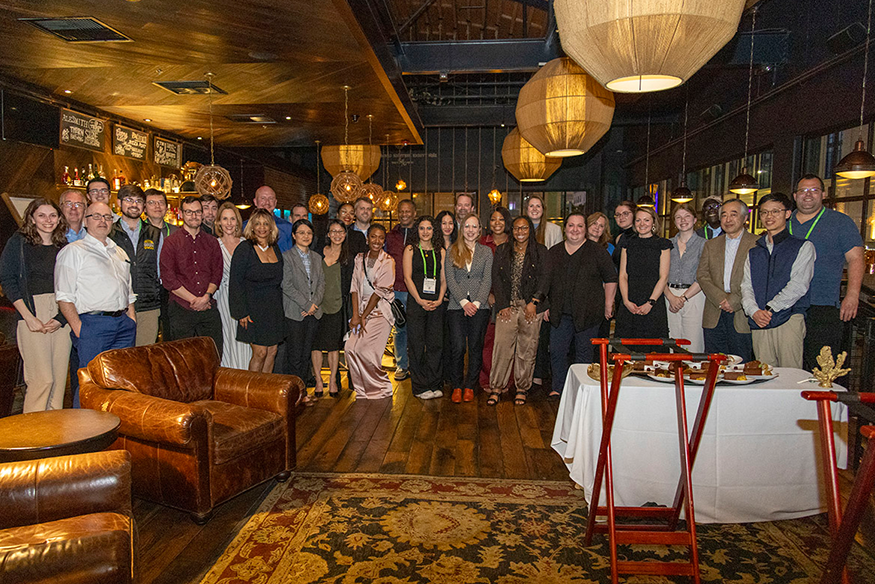




Massey research member Sunny Jung Kim, Ph.D., M.S., presented findings from two different research efforts at the AACR Annual Meeting 2024. One study examined the association between tobacco marketing exposure, media screen use and tobacco use among rural youth populations. Her other study looked at quality of life in cancer survivors who use cannabis, which supports future studies investigating psycho-oncology outcomes of cannabis use in cancer survivors.
VCU collaborators on these studies include Ghader Abbasabad, M.P.H., Jeremy Barsell, M.S., Bernard Fuemmeler, Ph.D., M.P.H., Kendall Fugate-Laus, Rashelle Hayes, Ph.D., LCP, Susan Hong, M.D., Vanessa B. Sheppard, Ph.D., and David Wheeler, Ph.D.

Paulette Omeaku, M.P.H., a student researcher at Massey and the Department of Health Behavior and Policy at the VCU School of Population Health, assesses the impact of Medicaid expansion on the use of colorectal cancer preventative services. Her findings indicate that although Medicaid expansion improved access to colorectal cancer screenings for low-income populations, additional barriers remain for minority groups and more targeted interventions are still needed.
"We know policies like Medicaid and Medicare are effective but they need to be created with communities in mind," Omeaku said.
VCU collaborators on this research include Eric Britton, Ph.D., Peter Cunningham, Ph.D., and Arnethea Sutton, Ph.D.

Massey researcher Arnethea Sutton, Ph.D., and Hilmaris Centeno-Girona, M.S., of the University of Puerto Rico Comprehensive Cancer Center, presented their findings from two different studies assessing clinical trials awareness and participation among Hispanic and Latino gastrointestinal cancer survivors, in populations from both the United States and in Puerto Rico. They found that many survivors were aware of clinical trials, but did not how to participate in them, prompting further assessment of the social determinants of health that impact clinical trials participation among these populations.
VCU collaborators on these studies include Katherine Y. Tossas, Ph.D., M.S., Victoria Williams and Robert A. Winn, M.D.

Massey research member David Turner, Ph.D., presented his study findings titled "Non-enzymatic glycoxidation reports on society, environment and biology to inform on enduring cancer disparities."
VCU collaborators on this research include Boxiao Ding, Victoria Findlay, Ph.D., and Bradley Krisanits, Ph.D.

Vignesh Vudatha, M.D., general surgery resident at Massey and the VCU School of Medicine, showed Massey director Robert A. Winn, M.D., his research that uncovered how living in redlined neighborhoods is linked to diminished survival in patients with the most common type of pancreatic cancer. This study supports the need for future research examining the intersection of Home Owners' Loan Corporation grades, residential distance from cancer centers and patient outcomes.
VCU collaborators on this study include Devon Freudenberger, M.D., Christopher Liu and Jose Trevino, M.D.

Carson Walker, Ph.D. student at Massey and the VCU School of Medicine, and Massey research member Chuck Harrell, Ph.D., showcased their efforts looking at the relationship between chemo resistance and the efficacy of an antibody drug conjugate in triple-negative breast cancer. Using a clinically approved drug called sacituzumab govitecan, they set out to identify predictive biomarkers of treatment response in breast tumors.
VCU collaborators on this research include Julia Altman, David Boyd, Ph.D., Mikhail Dozmorov, Ph.D., Nicole Hairr, Bin Hu, Ph.D., Rachel Myrick and Emily Zboril.

Polina Wright, a student in the laboratory of Massey research member Azeddine Atfi, Ph.D., presented her research unveiling a critical role of the enzyme transglutaminase 2 (TGM2) in pancreatic cancer development, opening avenues for targeted treatments to ultimately improve patient prognosis.

Winn Awards scholars and members of the national advisory council stopped by the Massey booth at the AACR Annual Meeting 2024. The program, named after Massey director Robert A. Winn, M.D., aims to increase diversity in clinical trials and transform the clinical research landscape.

Vignesh Vudatha, M.D., general surgery resident at Massey and the VCU School of Medicine, and Brooke Rhead of Tempus Labs, Inc., used artificial intelligence modeling to identify potential associations between pancreatic cancer mutational profiles, genetic ancestry and race/ethnicity. Their findings suggest that there are not large differences in mutational profiles for pancreatic cancer according to genetic ancestry or by race and ethnicity.
Massey surgeon-in-chief Jose Trevino, M.D., collaborated on this study.

The AACR 2024 Annual Meeting presented an opportunity for the Massey team to connect with the University of Puerto Rico Comprehensive Cancer Center (UPRCCC). Some UPRCCC students stopped by the Massey booth to say hello. In 2023, Massey and UPRCCC launched the post-doctoral BRIDGE fellowship focusing on Latino health. Researchers from both institutions teamed up to present research at the AACR conference.

Several members of the Massey team had the privilege to meet and discuss the future of cancer research with W. Kimryn Rathmell, M.D., Ph.D., M.M.H.C., director of the National Cancer Institute, during the AACR Annual Meeting 2024.

Massey director Robert A. Winn, M.D., chair of the AACR Cancer Health Disparities steering committee, met with the full committee ahead of the release of the 2024 Cancer Disparities Progress Report, May 15 on Capitol Hill. This landmark report features the latest research on why disparities in cancer incidence, diagnosis, treatment, and survival exist, and what can be done to address them. Additionally, it underscores tales of survival and highlights the work of policymakers in breaking down these disparities. Massey research members Katherine Y. Tossas, Ph.D., M.S., and Nolan Wages, Ph.D., are also on the steering committee.

Massey surgeon-in-chief Jose Trevino, M.D., delivered a presentation about moving beyond humble beginnings at a session designed for high school students titled "The Conquest of Cancer and the Next Generation of Cancer Researchers."
“Where you sit right now sets you up to be behind a podium like I am today talking about cancer," Trevino addressed the room of students.

Massey scientists — including research member Sandro R.P. da Rocha, Ph.D.; Ph.D. student Matthew Fernandez; and Douglas Sweet, Ph.D. — showcased how macrophaged-targeting immunotherapy enhances chemotherapy response for primary and metastatic breast cancer. Fernandez highlighted how their study demonstrated that macrophage immunotherapy in triple-negative breast cancer models leads to improved outcomes when used in combination with chemotherapy.
Other VCU collaborators on this research include Yasir Alshehry, Harry Bear, M.D., Ph.D., Jennifer Koblinski, Ph.D., and Laura Graham.

Krista Dalton, Ph.D., scientist in the laboratory of Massey research member Anthony Faber, Ph.D., presented her research exploring the relationship between metabolism and the epigenome in MYCN-amplified neuroblastoma. The findings could inform the development of novel treatment option for a high-risk disease that has few clinically actionable targets.
Other VCU collaborators on this research include Marissa Calbert, Colin Coon, Mikhail Dozmorov, Ph.D., Jennifer Koblinski, Ph.D., Timothy Lochmann and Lisa Shock, Ph.D.

Hannah Heath, a Ph.D. student at the University of Illinois Urbana-Champaign and collaborator with Massey director Robert A. Winn, M.D., studied how neighborhood violence alters genes and drives lung tumor growth. She hopes the findings could help change lung screening requirements and reduce cancer disparities.

Nora Hosseini, a Ph.D. candidate in the laboratory of Massey researcher Senthil Radhakrishnan, Ph.D., led a poster session on her research investigating the cellular mechanisms involved in autophagy and cancer cell death. Her findings indicate that targeting DDI2 in combination with autophagy inhibition could further potentiate novel proteasome inhibitor drugs as anti-cancer therapies. Holly Byers also collaborated on this study.

Massey research member Maria Thomson, Ph.D., showcased her work examining the relationship between medical mistrust and access to preventive cancer care among American Indian, Black and white Virginians. Her study demonstrated significantly elevated medical mistrust factors among Black and American Indian populations, but was not necessarily associated with access to preventive cancer care.
Jacqueline Knight Wilt, M.P.H., collaborated on this study.

Ashley Turner, Massey research assistant in the C.A.R.E.S. lab at VCU, presented her work investigating racial differences in treatment experiences among breast cancer patients receiving cardiotoxic therapy. Black breast cancer survivors are up to three times more likely to develop cancer therapy-related cardiac dysfunction when compared to White survivors, and this study found a significant difference between positive cancer care experiences reported by Black and white breast cancer survivors. VCU collaborators on this research include Susan Hong, M.D., Paulette Omeaku, M.P.H., Arnethea Sutton, Ph.D., and Victoria Williams.
"This [study] could be the driving factor to help us close that disparity gap," Turner said.

Lu Yang, Ph.D., Massey scientist in the VCU Department of Pharmacology and Toxicology, presented her research finding that dual degrader of HER2 and EGFR obliterates oncogenic signaling, overcomes therapy resistance, and inhibits metastatic lesions in HER2-positive breast cancer models. The results provide new insights and innovations to advance treatment of drug-resistant HER2-positive breast cancer that remains an unmet problem.
VCU collaborators include Arup Bhattacharya, Yun Li, Darrell Peterson, Valentina Robila, M.D., Ph.D., and Yuesheng Zhang, M.D., Ph.D.

Emily Zboril, a Massey Ph.D. student in the lab of Chuck Harrell, Ph.D., assessed the efficacy of new endocrine therapies in treating ER-positive breast cancer that has spread to the bone. Zboril will expand on this effort to determine if other endocrine therapies will provide better protection to the bone architecture while reducing metastatic burden in tumor cells.
Other VCU collaborators on this research include Julia Altman, David Boyd, Ph.D., Henry Donahue, Ph.D., Mikhail Dozmorov, Ph.D., Nicole Hairr, Rachel Myrick and Amy Olex, Ph.D.

Konstantinos Floros, Ph.D., a scientist in the laboratory of Massey research member Anthony Faber, Ph.D., presented research findings that pharmacological targeting of SUMOylation leads to cBAF complex stabilization and disruption of the synovial sarcoma signature, positioning the novel therapeutic used in the study as a clinical candidate to treat this refractory cancer.
Other VCU collaborators on this research include Krista Dalton, Ph.D., Mikhail Dozmorov, Ph.D., C.K. Fairchild, Bin Hu, Ph.D., Jennifer Koblinski, Ph.D., Senthil Radhakirshnan, Ph.D., Jane Roberts, Angeliki Stamatouli, M.D., and Y. Xing.

Massey research member Joseph Landry, Ph.D., presented his study findings after investigating the dual inhibition of chromatin remodeling and DNA methylation as a novel treatment option for triple-negative breast cancer (TNBC). This study suggests that a combination therapy regimen including BPTF inhibition with a DNA methyltransferase inhibitor could provide clinical benefits to patients with TNBC through both tumor cell intrinsic and extrinsic mechanisms.
VCU collaborators on this research include Harry Bear, M.D., Ph.D., James Kang, Rebecca Martin, Ph.D., and C. Morecock.

Amy Tang, Ph.D., scientist at Eastern Virginia Medical School, presented findings from her study in collaboration with Massey physician-researcher Harry Bear, M.D., Ph.D., examining the relationship between racial disparities and treatment resistance in breast cancer. This research demonstrates the prognostic power of the SIAH gene for patient risk stratification, therapy quantification and relationship to racial disparity in triple-negative breast cancer.
"We could really begin to save lives" by expanding on this effort, Tang said.
Other VCU collaborators include Michael Idowu, M.D., M.P.H., Jennifer Koblinski, Ph.D., and Valentina Robila, M.D., Ph.D.
Written by: Blake Belden and Amy Lacey
Center News & Funding, Research, Prevention & Control, Clinical, Technology
Breast imaging expert explains how new FDA mammogram rules help patients make informed decisions about their careSep 27, 2024
Clinical, Research, Center News & Funding
Get C-SMART: Massey neuropsychologist seeks to enhance brain wellness in neuro-oncologySep 23, 2024
Center News & Funding, Community Engagement & Health Equity, Massey 50
Massey hosts congresswoman, highlights efforts to reduce cancer burden for all VirginiansSep 16, 2024
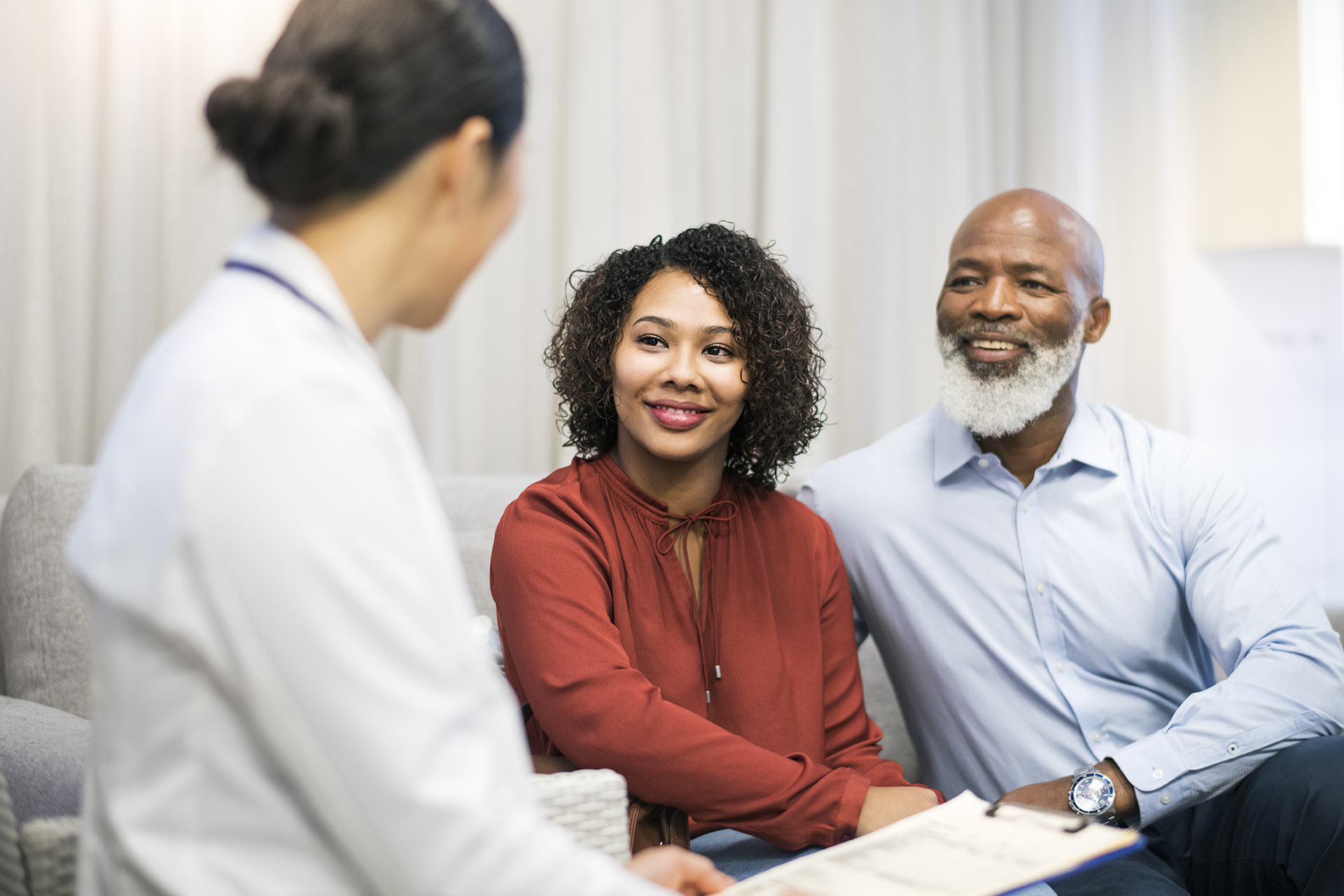
Treatments in clinical trials may be more effective or have fewer side effects than the treatments that are currently available. With more than 200 studies for multiple types of cancers and cancer prevention, Massey supports a wide array of clinical trials.
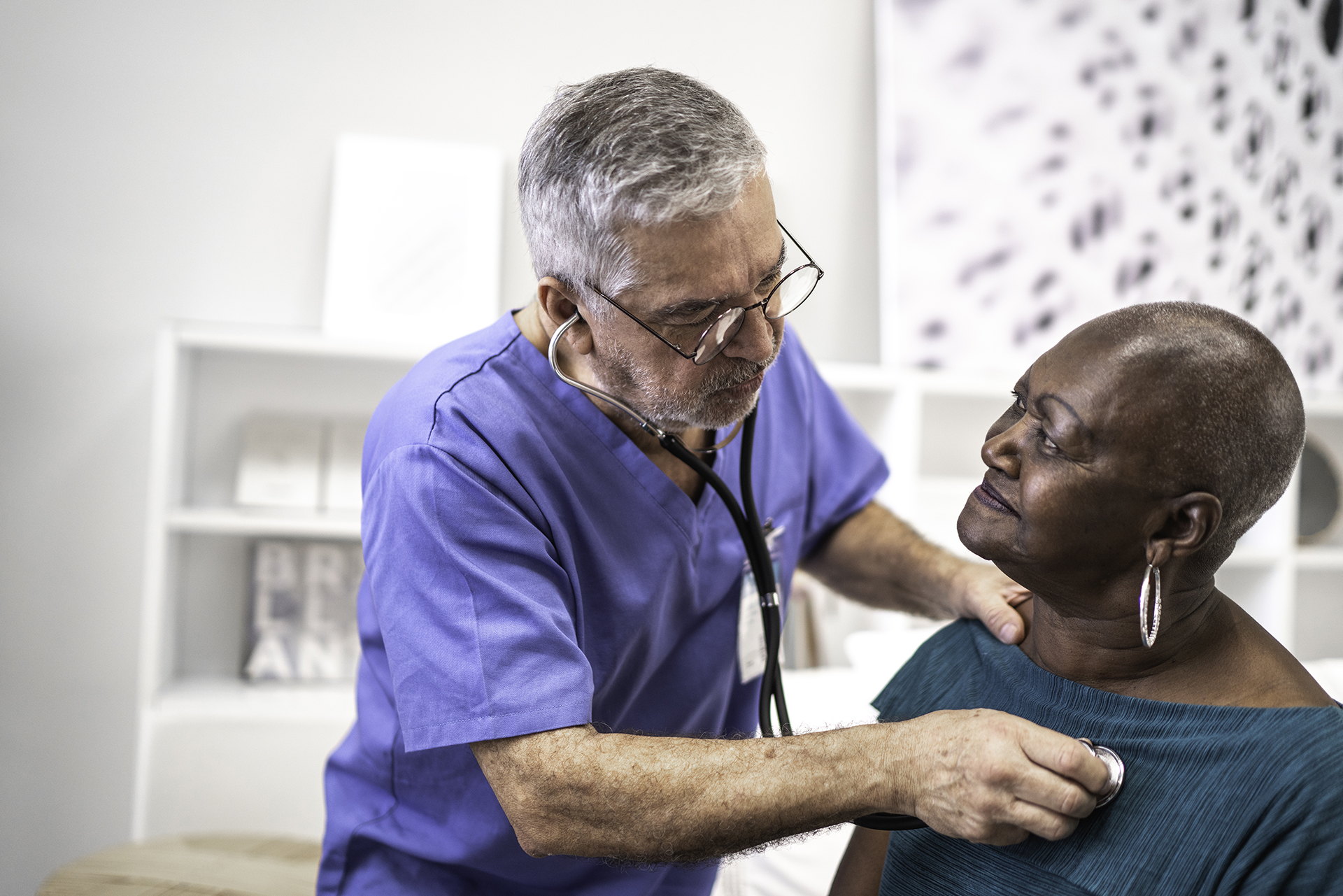
Massey supports hundreds of top cancer specialists serving the needs of our patients. Massey’s medical team provides a wealth of expertise in cancer diagnosis, treatment, prevention and symptom management.